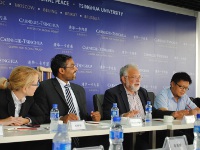Registration
You will receive an email confirming your registration.
IMGXYZ3178IMGZYXIn June, President Obama described a planned “transition period” for Afghanistan in 2014, involving an Afghan-led effort aimed at maintaining domestic stability with international support. In the lead-up to this new phase, the United States has argued that it shares similar interests with China in seeing Afghanistan and Pakistan achieve stability, security, and prosperity. Vikram Singh, deputy special representative for Afghanistan and Pakistan in the U.S. Department of State, and Dr. Barnett Rubin, director of studies and senior fellow at the Center on International Cooperation at New York University, raised key issues associated with the transition in meeting with a panel of Chinese experts during the ninth session of the “China-South Asia Dialogues” seminar series. Carnegie’s Lora Saalman moderated the event.
The Nature of Transition
- Strategic Partnership: The term “strategic partnership” is intended to clarify U.S. long-term aims in the region, providing both certainty for the Afghan government and transparency for other regional actors, explained Singh. He emphasized that the U.S.-Afghanistan partnership is not an excuse for a continued U.S. presence, as U.S. authority in the region would be a destabilizing force and run counter to Afghan interests. Instead, the U.S.-Afghanistan partnership has three primary goals:
- Build and strengthen Afghan security forces;
- Maintain U.S. counterterrorism capabilities;
- Cooperate on countering narcotics and engage in drug-trafficking interdiction.
- Build and strengthen Afghan security forces;
- U.S. Military Presence: One Chinese panelist noted that a number of regional powers, including Pakistan and Russia, have concerns about ongoing U.S. military presence in Afghanistan after 2014. Singh stressed that any forces that remain will be under the auspices of the Afghan government and there will be no permanent U.S. bases in Afghanistan. While Russia, India, and China do not want a long-term U.S. security presence in the country, no power wants the United States to leave too quickly and risk destabilizing the country, he argued. The United States hopes to gain a better grasp of regional concerns, build confidence with regional powers, and demonstrate the transparency of U.S. actions by official visits to the region, Singh explained.
- Political Process is Key: Singh highlighted the importance of reconciliation and the political process in Afghanistan, emphasizing that a military solution alone will not resolve regional issues. He criticized the tendency to lump al-Qaeda and the Taliban together, and instead separated them into two distinct issues, namely international terrorism and domestic conflict. Yet, this approach presents new challenges. No opportunities have arisen for dialogue with the Taliban, as it lacks a centralized authority and credible spokesperson, Singh argued. Still, he stressed that the United States supports talks and negotiations between the Taliban and the Afghan government.
- NATO Withdrawal: One Chinese expert questioned whether a withdrawal by the North Atlantic Treaty Organization (NATO) would be sustainable if Afghanistan’s President Hamid Karzai has not solidified his authority. He asked whether it might be possible to replace NATO troops with those from Islamic countries. Singh explained that after 2014, the situation in Afghanistan would be likely to include residual U.S.-NATO support. Involvement by the Organization of Islamic Cooperation (OIC), among other creative initiatives, might become part of the process, he suggested. However, there is currently no concrete proposal and one will not be decided upon until NATO begins to withdraw, said Singh. Impending withdrawal could actually help galvanize the country, motivating the population to focus on and support its own Afghan internal security forces, he added.
Regional Involvement
- U.S. and China’s Aligned Interests: Both the United States and China have fundamentally similar interests when it comes to Afghanistan, argued Singh. He noted both powers agree that Pakistan’s concerns should be taken into account to enable the Pakistani government to manage its internal challenges. Despite the raid that killed Osama bin Laden in May, Singh argued that the U.S.-Pakistan relationship remains strong. In the future, Washington’s main concern is to help stabilize Pakistan’s economy, in part by encouraging Pakistan’s allies to help it meet its financial obligations. In this regard, China can play a major role, Singh contended.
- Pakistan and India’s Support: For a significant change in Afghanistan’s political process to occur, Pakistan’s support of operations along the border is key, explained Singh. He added that, in return, Pakistan needs to feel reassured that India’s actions in the area do not affect its sovereignty. Pakistan has no objection to strong Afghanistan-India relations; however, it remains concerned that India will utilize the opportunity to gather intelligence.
- U.S.-India-Pakistan Triangle: One Chinese expert queried how Washington seeks to balance relations among the United States, India, and Pakistan. Singh replied that the United States must not try to triangulate too much among the three countries. The United States continues to support constructive Indo-Pakistan dialogue and is concerned by the low level of bilateral trade between the two countries, noted Singh. Extension of the Afghanistan-Pakistan Transit Trade Agreement of June 2011 to India would constitute one means of addressing these issues, said Singh.
Seeking a Balance
Discussants: Cheng Ruisheng, Ma Jiali, Ren Jingjing, Mao Jikang, Yang Qianru, Yang Danzhi, Liu Xuecheng, Li Li, Chen Zonghai, Song Haixiao, Yang Xiaoping, Chen Jing, Lin Yunzhi
